ELEANOR’S TEDDINGTON LIFE STORY
At the end of September Teddington Town highlighted an amazing new book called Lifestories which told the fascinating individual stories of some local residents of Teddington giving an insight into what life was like then and the challenges people faced. They are all compelling in their content and recollection. Today, we feature the full story of ELEANOR
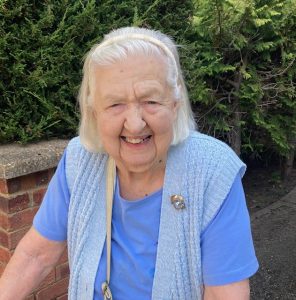
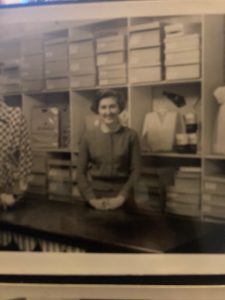
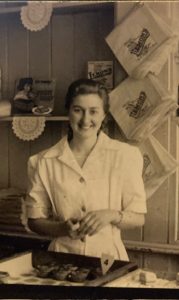
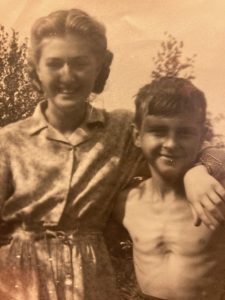
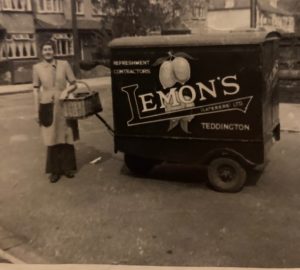
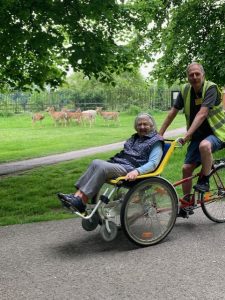
LIFE STORY – ELEANOR:
I moved to Teddington in 1940, aged 9 with my mum Esma and aunty Edie and my cousin Barry, who I always looked after because he was three years younger than me. We’d lived in Camden but it was heavily bombed.
I was at school on the day it was bombed to the ground, there was nothing left of it. We all got out and no one was killed thankfully, but the school was gone, and we couldn’t go anymore.
So they sent a mobile school, which was once a week and you’d do your English and arithmetic and they’d set you more homework to do for the rest of the week.
But because we got bombed out so many times we had to move away. My aunt Edie got a job at Lemon’s Bakery, in Teddington, which was a very big bakery on High Street – now the Fara Kids charity shop – and me and my mother followed her soon after – we went all the way from Camden to Teddington with all our belongings on the number 27 bus. We found a little cottage on Watts Lane which was very run down but we made it as comfortable as we could.
My cousin Barry and I started school at Christ Church school in Cedar Road, Teddington, which isn’t there any more. But the headteacher there wasn’t nice to me.
Because of my interrupted schooling in Camden, I couldn’t do some of the subjects the others could, particularly long division. The headteacher decided she was going to make an example of me and brought me out in front of the whole school at assembly and she turned to all the children and said ‘this dirty little Londoner can’t even do long-division”. I was furious. I looked at the headteacher and walked off the stage, she shouted “Come back here!”, but I wasn’t having it. Barry was in the group of children in the assembly and I said “Come on Barry, we’re not staying here”, and I took his hand and we left.
My mum was so angry with the headteacher and so we were moved to St Mary’s and St Peters on Church Road which was lovely.
Eleanor and her younger cousin Barry.
I left school at 13, and did a variety of jobs. My mother got a job with Lemons bakery taking a wooden cart around the streets of Teddington selling bread and cakes. My mum would walk 12 miles a day puling that cart, and I used to go with her to help sometimes. Then Lemons gave me a full time job in the shop. The shop wasn’t taking much money at that time, but for some reason when I started sales got much better.
They asked me to be the manageress. I said: “I’m only thirteen you know” but they said that was ok. We did a roaring trade from then on, I don’t know why, maybe because customers saw this young girl running it and they thought it was different. But it worked.
Then I was asked to work at a general store called Faimars, on the corner of Stanley Gardens Road – and they taught me to bone bacon, cut up meat and cheese and such like.
I also worked in their shop in Lavender Hill for a while until I got a job in Marks and Spencer. Then I worked on the pleasure boats on the Thames for a season.
Eleanor at Lemon’s Bakery in Teddington, now Fara Kids.
My mother Esma was wonderful, and my grandmother Lucy Ellen was a suffragette and when my mum was young, she met many of the suffragettes. My mum named me after her, but Eleanor Lucy instead of Lucy Ellen.
I remember when the Americans set up base in Bushy Park in the early 1940s, they had everything there. They had a theatre, a general store called a PX Store, a big dining hall with all the food you could imagine.
There was rationing for everyone at that time, but not in that camp, they had everything. They regularly invited the local people in. They invited us for Christmas lunch one time, all the local people and kids from the local schools .
We hadn’t had much food of course, and it was wonderful when we were there to have turkey and all the things we could only dream about. They had butter, sugar, eggs, milk and chocolate.
Things we just couldn’t get over here at that time. No rationing in that camp though. Fruit, vegetables .. and Wrigleys chewing gum – we’d never seen that before.
We went a few times into the camp, my mother came with me because I wasn’t very old then. And they would give us food to take home sometimes, It was wonderful.
We saw General Eisenhower there – he was the general who was leading the plan for the D-Day landings – he came regularly to see ‘his boys’ . He was driven in in his jeep, he was waving to us all.
They had all sorts of people visiting the camp. Once, Clark Gable came – he was a huge heart-throb film star at the time, and he was in the US army too,
All us locals crowded round to see him arrive in his car. His car stopped and he said “Hello kids, how are you?” And he asked if we’d seen any of his pictures, and we all shouted “Yes!!!”. Most of us hadn’t, of course.
Teddington was full of Americans in 1943,and 1944. You saw them down the High Street, and they held a regular dance at the Clarence Hotel on Park Road (now the Park Hotel) where lots of locals used to go.
I have very fond memories of Teddington in my early days here. Everyone knew each other and pulled together, yes there was a war, and then rationing and things were very tough but life was so uncomplicated.
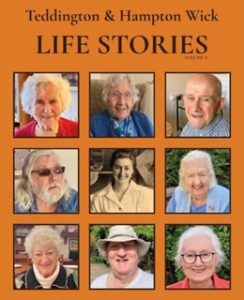 The book is published by Teddington & Hampton Wick Voluntary Care Group, which is celebrating its 50th anniversary of helping elderly and housebound people in the local community.
The book is published by Teddington & Hampton Wick Voluntary Care Group, which is celebrating its 50th anniversary of helping elderly and housebound people in the local community.
The stories are also available on the group’s website: www.tedcare.org.uk
It is hoped that further volumes of ’Life Stories’ will be published in the future.
Anyone wishing to be included or just wanting to know more can email: lifestories2026@outlook.com







